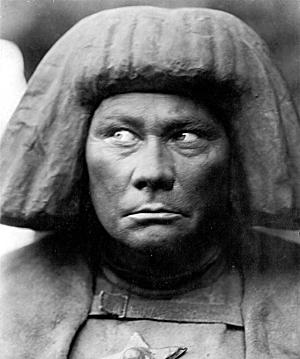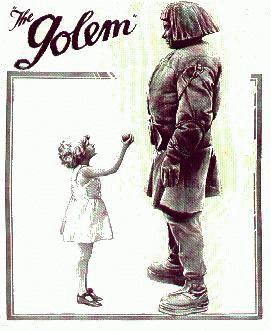Years pass. I get the passport finally but never depart. I do, however, begin daily pushups. I have SICK PECS now. Still single. Each night, I log on the Wide Wide Web, pick a crazy outing-literate, often, and heady (David Sedaris reads from his new book of stories at the Barnes & Noble at Union Square, 7 PM)-and sometimes I date. ("Hell yeah I like Walt Whitman. How about you?")
Mom's subtlety ebbs. "IT'D SURE BE NICE TO HAVE A DAMN GRANDKID BEFORE I DROP DEAD."
"Next trip to Holland, maman, I won't pack condoms. Cool?"
 And so on. I punch up this Golem, German expressionist flick circa 1920. Chabon didn't even invent the ripoff, it seems. Double plagiarism! It's showing at the Museum of Jewish Heritage, whose full legal name is A Living Memorial to the Holocaust: Museum of Jewish Heritage.
And so on. I punch up this Golem, German expressionist flick circa 1920. Chabon didn't even invent the ripoff, it seems. Double plagiarism! It's showing at the Museum of Jewish Heritage, whose full legal name is A Living Memorial to the Holocaust: Museum of Jewish Heritage.
I showed up late, though, and missed the chance to follow the single-looking damsel-types to their seats. ("I know it's dark in here, miss, but I suspect you are beautiful. Don't worry, I'm kidding. I noticed you in the lobby, actually, stole a few snapshots with my Sprint Foto-Fone-which incidentally I've autoposted to my blog via wireless BlueTooth USB-then sneakypeted in behind you. Josh Axelrad, by the way. You've got nice calves: four stars. What? Out of five. Seriously. That's pretty good.") By the time I make my way past the metal detectors, the house lights are half-down and the audience quiet. There is a blank screen on stage, an array of chairs (4) and microphones (many) at stage left. In my notebook I write: "4 musicians? Or is there like an upright bass also?"
No upright bass. The quartet, Davka, which is Jewish for "contrary to expectations," hails from the Bay Area. There's violin, cello, percussion, bassoon. The second these blokes take the stage I stop thinking about girls. The violinist, Daniel Hoffman, sits nearest the audience and does the hellos. His voice alone is brilliantly cadenced, nuanced. He practically reeks of music. A minute later they've launched into an introductory ditty, and I catch myself thinking, "I'm still not thinking about girls."
These men are geniuses.
Traces of everything: Classical; klezmer; Middle-Eastern Ashkenazi jazz. I'm no musicologist and had to crib those terms from their website, but even ignoramuses will sense an admixture of styles, alternately fast and slow, pointed and meandering. The movie hadn't even begun and I was enthralled. Hoffman was a showman to boot, leaning into his instrument like a NASCAR champion stuck to the edge of his bucket on some multi-G turn.
Then the movie got going. The music remained fascinating in places, with a crazy mix of citations, everything from "Thus Spake Zarathustra" to "The Munsters." Dead serious. It all gelled perfectly with the action.
 The story of the golem, I end up realizing, is very old, and written by Jews. Mary Shelley joins Chabon in that plagiarists' club, I guess. The most famous version of the tale dates back to the 16th century, when the great and powerful Rabbi Loew of Prague is said to have brought the clay man to life. Different versions of the yarn have him doing this in different ways. A popular approach is to inscribe the Hebrew word emet ("truth," girls) on his forehead; when the monster runs amok in the ghetto, you can then de-animate him by erasing part of the word so it instead reads met (or "death"). In the 1920 film, you scribble aemeth on a slip of paper (presumably the exotic diphthong better connotes black magic), insert the paper into an amulet and then screw the amulet into the monster's chest. He comes to life and thwarts the local tyrant's intended pogrom (bravo!) but then, yes, runs amok in the ghetto, threatening a pogrom of his own. You kill him by unscrewing the amulet, which, for reasons of narrative exigency unique to the film, only shikse toddlers can accomplish.
The story of the golem, I end up realizing, is very old, and written by Jews. Mary Shelley joins Chabon in that plagiarists' club, I guess. The most famous version of the tale dates back to the 16th century, when the great and powerful Rabbi Loew of Prague is said to have brought the clay man to life. Different versions of the yarn have him doing this in different ways. A popular approach is to inscribe the Hebrew word emet ("truth," girls) on his forehead; when the monster runs amok in the ghetto, you can then de-animate him by erasing part of the word so it instead reads met (or "death"). In the 1920 film, you scribble aemeth on a slip of paper (presumably the exotic diphthong better connotes black magic), insert the paper into an amulet and then screw the amulet into the monster's chest. He comes to life and thwarts the local tyrant's intended pogrom (bravo!) but then, yes, runs amok in the ghetto, threatening a pogrom of his own. You kill him by unscrewing the amulet, which, for reasons of narrative exigency unique to the film, only shikse toddlers can accomplish.
The combination of the very good music with the film's freaky expressionist sets-imagine Antonio Gaudí designing a dungeon for a BDSM club hidden on the soggy grounds of a plantation near Avery Island, Louisiana-left me in a contemplative mood. When the lights came up I applauded vigorously, then wandered out through the crowd, not flirting at all, although I felt I had tremendous things to say.
I stepped outside. Battery Park City, they call it. It was precisely the moment of sunset and the light against the towers around me was peculiarly charged. The metal and glass walls shone with the hollowness of a neon sign running on fumes. I felt they might suddenly shatter, shrapnel come raining around me with that tinkling sound from bullet casings falling in The Matrix.
I felt unalive, signorine. Lack of woman, is it? I can't say. I know it's bad to go to Holocaust memorials hoping to score some ass. Maybe I'm a soulless lump of clay. Maybe I need the word "LOVE" etched in my chest by a set of long nails. Give me some oomph, some vitality, until of course I screw the pooch again with weird or errant behavior and she digs her wrathful claws against my chest, leaving behind the word "LO!"
And I plum drop dead.

Brooklyn's latest hepster yids make good
July, 2004
Faux feminism on the silver screen
June, 2004
June, 2004
March, 2004
From Israeli speed-metal to Jewish post-jazz
November, 2003
June, 2003
The soft borders between Jewish particularism and universalism
February, 2003
Sean Penn and intertextuality
September, 2002
Am I an environmentalist for the same reasons I don't like to spend money?
April, 2002
Why are rock stars irresistibly attractive, even if they're pale and
pimply?
February, 2002
Two related theories about Bob Dylan, or, a review of his November 19,
2001 show, in which divine revelation plays a significant role.
December, 2001



The Spiritual Foundations of Bushism
Jay Michaelson
Sex and the Golem
Joshua Axelrad
How Jewish is Modigliani?
Esther Nussbaum
Steel and Glass
Dan Friedman
No Matter What, I Wish You Luck
Chanel Dubofsky
Falafel Ghosts
Shaun Hanson
Archive
Our 500 Back Pages
Saddies
David Stromberg
Zeek in Print
Spring/Summer 2004 issue now on sale!
About Zeek
Mailing List
Contact Us
Subscribe
Tech Support
Links
From previous issues:
Elephant Memory
Jay Michaelson
four untitled poems
Joseph Dobkin
 Email us your comments
Email us your comments